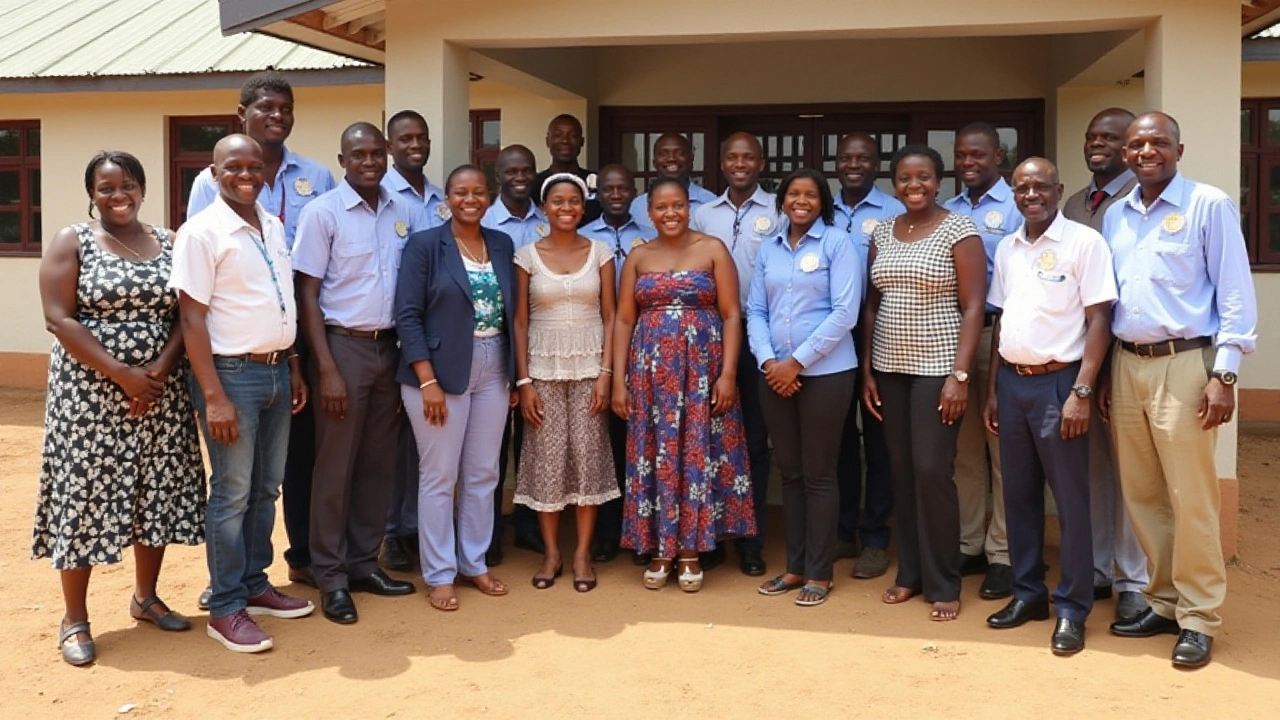The Urgent Need for Climate Adaptation in Marsabit County's Dairy Sector
In the ever-changing landscape of agriculture, adaptability is perhaps the most significant tool farmers can possess. Marsabit County, located within the arid and semi-arid lands (ASALs) of Kenya, exemplifies the frontlines where climate change meets daily agricultural challenges. The region's inhabitants have long been at the mercy of extreme weather patterns, experiencing severe droughts and erratic rainfall. Such conditions are detrimental to traditional farming methods, making it difficult for local communities to maintain their livelihoods.
Recognizing the untenable situation, the Jomo Kenyatta University of Agriculture and Technology (JKUAT) launched an ambitious climate adaptation project targeting Marsabit County's dairy sector. This innovative program does not stand alone—it receives collaborative support from Kenya's Ministry of Agriculture, Livestock, Fisheries and Irrigation, alongside various local and international organizations devoted to sustainable agriculture. The project's mission is clear: enhance the resilience of dairy farming to the capricious climate, ensuring the industry survives and thrives amid adversity.
Strategies for Climate-Smart Agriculture (CSA)
The preeminent strategy revolves around introducing climate-smart agriculture (CSA) practices, a modern approach heralded to galvanize the struggling dairy sector. One of the cornerstones of CSA is transitioning to drought-resistant fodder crops. Such crops are engineered to withstand significant reductions in water availability, presenting a sustainable alternative to traditional feed that often fails during droughts. Farmers are further equipped to manage water more efficiently through state-of-the-art irrigation techniques that promise higher crop yields even in the driest conditions.
Another component enabling this transformation involves comprehensive farmer training programs designed to disseminate knowledge about CSA techniques. This education empowers farmers with the know-how to adapt their traditional practices to modern, sustainable ones that mitigate the impacts of climate variability. The expectation is that these newly acquired skills will pave the way for continuous innovation within the sector, setting a precedence for adaptation and resilience.
Aligning with National Goals: ASTGS
The project's objectives dovetail neatly with Kenya's Agricultural Sector Transformation and Growth Strategy (ASTGS). This strategy outlines a future where agricultural practices are climate-resilient, promoting food security while fostering improved farmer incomes. By syncing with national goals, the initiative not only functions at a local level but also contributes to a broader agenda aiming to facelift Kenya's entire agricultural framework.
Astutely anticipating the future of agriculture, ASTGS places climate resilience at the forefront of its policies. By adopting these principles, the Marsabit County initiative strengthens its position as a leader in transforming Kenya's agricultural sector. Practically, alignment with ASTGS ensures continued support and resource allocation, permitting smallholder farmers to consistently improve their yields and livelihoods.
The Broader Impact: Sustaining Livelihoods and Food Security
Bringing such an initiative to a region frequently vulnerable to climate change underlines the broader significance of sustainability in agriculture. For many residents of Marsabit County, dairy farming is more than an economic activity—it's a way of life, deeply intertwined with familial traditions and community structures. By continuously supporting this sector, the project works to protect these cultural practices from upheaval, allowing communities to thrive even in the face of environmental adversity.
The sustainability brought by incorporating CSA practices directly translates to enhanced food security. More reliable and resilient farming practices lead to greater productivity, ensuring that more families can rely on consistent sources of nutrition and income. This heightened security advises optimism across Marsabit County and extends to other ASALs, sowing seeds of hope and resilience in an agricultural cutoff from its former reliance on the predictability of nature.
Promoting Long-Term Growth and Economic Stability
The economic ramifications of a robust dairy sector cannot be overstated. Agriculture forms the backbone of Kenya's economy, contributing immensely to its GDP and providing numerous employment opportunities. The Marsabit County initiative, by fortifying the local dairy industry through climate adaptation, indirectly influences the national economy by ensuring stability and growth.
Continued support and expansion of climate-smart strategies indicative of Marsabit's project may serve as a blueprint for elsewhere. Emulation of success leads to broader economic revitalization, with ancillary sectors benefiting from heightened activity within the agricultural sphere. The spread of knowledge, improved technologies, and a commitment to resilience stand out as paramount achievements of this initiative.
Ultimately, the project's legacy will be written in the farming fields of Marsabit County, where sustainable initiatives transform lives. The region might yet become a beacon of hope for other areas struggling with similar environmental challenges, proving that with the right blend of innovation, support, and perseverance, the impacts of climate change can be met head-on and overcome.









17 Comments
From a systems‑engineering perspective, the integration of climate‑smart agriculture (CSA) within the dairy value chain in Marsabit represents a quintessential example of adaptive capacity enhancement, leveraging endogenous knowledge networks and exogenous technological diffusion. The deployment of drought‑resistant forage cultivars operates as a biophysical buffer, attenuating the stochasticity associated with precipitation deficits while preserving metabolic homeostasis in lactating bovines. Concurrently, precision irrigation regimes, powered by remote sensing telemetry, facilitate spatiotemporal water allocation optimization, thereby minimizing evaporative losses and maximizing agronomic output. Farmer capacity‑building workshops, structured around participatory action research methodologies, engender epistemic empowerment, fostering a feedback loop where experiential learning informs iterative protocol refinement. Moreover, the alignment with the Agricultural Sector Transformation and Growth Strategy (ASTGS) ensures policy‑level synergies, unlocking fiscal instruments that subsidize capital-intensive infrastructure upgrades. Interdisciplinary collaborations between JKUAT researchers, Ministry of Agriculture officials, and NGOs catalyze knowledge co‑creation, enhancing the robustness of the intervention. The resultant incremental gains in milk yield, coupled with the diversification of feedstock portfolios, mitigate systemic vulnerabilities inherent to arid and semi‑arid landscapes. In the broader macroeconomic tableau, such resilience mechanisms contribute to food security buffers, stabilizing market supply chains amidst climatic perturbations. The empirical data emerging from pilot sites indicate a statistically significant reduction in feed‑related expenditures, translating into improved farmer net margins. This financial uplift, when aggregated across the county’s smallholder cohort, portends a multiplier effect on ancillary sectors, including veterinary services and dairy processing. Ultimately, the confluence of biophysical innovation, institutional support, and community agency delineates a replicable model for climate adaptation in pastoral ecosystems, underscoring the imperative of integrative, evidence‑based policy design.
It is disconcerting that many still prioritize short‑term gains over the moral imperative to safeguard vulnerable communities. Sustainable practices should be non‑negotiable, not an optional supplement.
The collaborative spirit shines through, and the local farmers seem genuinely empowered 😊. Integrating traditional herding knowledge with modern agronomy creates a resilient hybrid model. It’s heartening to see tangible hope sprouting in the arid zones.
Hey folks, love seeing the blend of old and new here. It's like teaching an old dog new tricks but the dog is actually the whole community
Indeed, the inclusive mentorship approach, coupled with rigorous data‑driven monitoring, amplifies stakeholder buy‑in; moreover, the iterative feedback loops, which incorporate farmer testimonies, ensure contextual relevance, thereby fostering sustainable adoption rates.
Smart move. Climate‑ready dairy keeps milk flowing.
This is precisely the kind of national‑level initiative that showcases our country’s technological leadership; leveraging high‑performance agritech is not just an option, it’s a duty.
While the project sounds impressive on paper, one must scrutinize the actual on‑ground implementation-are the promised resources reaching the smallestholders or merely staying within bureaucratic pipelines?
Nice perspective, but let’s remember the cultural nuances that shape how dairy traditions are lived; tech alone won’t bridge the gap unless it respects local customs.
this is reallly great we’re seeing real change that matters. i love how the community’s voice is being heard.
Exactly! The empowerment vibe is palpable 😊. When people see tangible results, motivation skyrockets.
Agreed, the momentum is promising; however, sustained funding will be crucial to avoid regression.
From an agronomy standpoint, the integration of drought‑tolerant forages is a game‑changer. The data shows a clear uptick in milk yields, and the farmer testimonies are encouraging. Keep the updates coming! 👍
Oh sure, because swapping a few grass varieties will magically solve centuries of vulnerability – bravo! 🎭
Interesting approach.
Let us unpack the epistemological underpinnings of this climate‑adaptation narrative, for the layperson’s comprehension is insufficient without a deep dive into the dialectical tensions between neo‑liberal agribusiness paradigms and indigenous agro‑ecological wisdom. The project ostensibly champions resilience, yet it simultaneously co‑opts local land tenure structures into a commodified framework that perpetuates systemic inequities. By branding drought‑resistant fodder as an innovation, the discourse frames a technological fix as the panacea, ignoring the sociocultural capital embedded in traditional pastoral practices. Moreover, the infusion of precision irrigation technology, while ostensibly efficient, risks engendering dependency on external inputs, thereby eroding autonomous adaptive capacity. One must also critique the top‑down dissemination of training modules, which often privilege academic jargon over experiential learning, creating a knowledge asymmetry that marginalizes the very beneficiaries. The alignment with ASTGS, while outwardly cohesive, may serve as a bureaucratic veneer, smoothing over the granular complexities of implementation on the ground. It is imperative to interrogate the metric frameworks employed to assess ‘success’; quantitative milk output alone cannot capture the nuanced dimensions of food sovereignty and cultural continuity. The strategic partnership model, though lauded, may inadvertently reinforce power asymmetries between donor agencies and local stakeholders, perpetuating a neo‑colonial agenda under the guise of sustainability. In sum, without a reflexive critique of these power dynamics, the initiative risks reproducing the very vulnerabilities it seeks to ameliorate, relegating climate adaptation to a superficial veneer of progress.
Astoundingly, the discourse dances around the real issue, glossing over the entrenched elite interests that siphon resources; true transformation demands a radical reimagining of agrarian power structures.